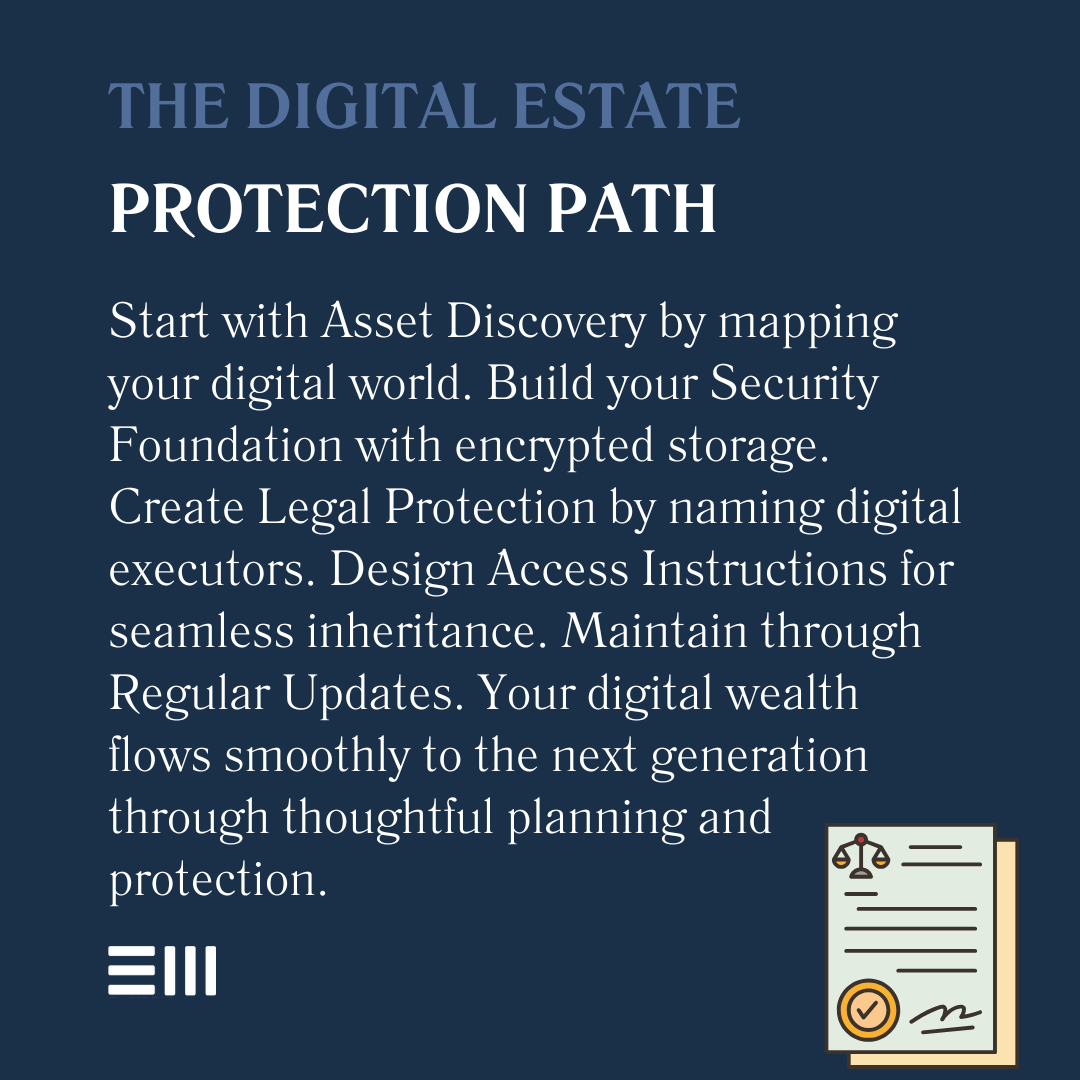Every time you check your email, scroll through social media, or access your cryptocurrency wallet, you're interacting with digital assets worth an average of $55,000.
From photos stored in the cloud to cryptocurrency investments, these digital holdings shape an increasingly significant portion of modern estates.
Understanding Digital Assets in Estate Planning
The digital revolution has transformed not just how we live, but also how we need to plan for the future of our assets.
Digital assets encompass everything from your social media accounts and email to cryptocurrency investments and online banking profiles.
As our lives become increasingly digital, protecting these assets has become as important as safeguarding physical property.
The complexities of digital asset management extend beyond simple password sharing. Federal privacy laws, terms of service agreements, and state regulations all influence how these assets can be transferred after death.
Many people overlook these digital possessions when estate planning, potentially leaving thousands of dollars in assets inaccessible to their heirs.
Understanding and properly planning for digital assets ensures that your entire estate – both physical and virtual – remains protected and accessible to your chosen beneficiaries.
Types of Digital Assets to Consider
As technology continues to evolve, the category of digital assets grows more diverse and complex each year.
Understanding the full scope of your digital holdings is the first step toward protecting them effectively.
Financial Digital Assets
Alabama courts evaluate numerous factors to ensure fair property division:
Economic Factors:
- Each spouse's current income;
- Future earning potential;
- Job skills and education level;
- Business ownership and valuations;
- Retirement benefits and pension plans; and
- Tax implications of property division.
Personal Factors:
- Marriage duration;
- Age and health of each spouse;
- Child custody arrangements;
- Contributions to the marriage;
- Standard of living during marriage; and
- Each spouse's separate assets.
The court also considers whether either spouse:
- Contributed to the education or career advancement of the other;
- Maintained the household and cared for children;
- Helped build or grow a family business; and
- Committed marital misconduct affecting finances.
These factors help judges determine the most equitable way to divide property, ensuring both parties can maintain reasonable living standards after divorce.
Personal Digital Assets
The sentimental value of personal digital assets often outweighs their monetary worth. Family photos stored in cloud services, email correspondence, and social media accounts hold immense sentimental value.
These assets often contain precious memories and important personal information that families wish to preserve.
Business Digital Assets
Digital assets have become central to modern business operations and require special consideration in estate planning.
Domain names, online business accounts, customer databases, and intellectual property stored digitally form crucial business assets. Proper planning ensures business continuity and protects valuable commercial information.
Digital Collections and Entertainment
The entertainment industry's digital transformation has created new forms of assets requiring protection.
Digital music libraries, e-books, video game accounts, and other entertainment subscriptions represent both monetary and personal value that should be addressed in estate planning.
Legal Considerations for Digital Assets
The legal framework surrounding digital assets continues to evolve as technology advances and new challenges emerge.
Understanding these legal considerations helps ensure proper protection of digital assets.
State and Federal Laws
The digital asset legal landscape varies by jurisdiction but follows some common principles. The Revised Uniform Fiduciary Access to Digital Assets Act (RUFADAA) provides legal framework for handling digital assets after death.
Terms of Service Agreements
Platform policies can significantly impact digital asset transfer after death. Many digital platforms have specific policies regarding account transfer after death.
Understanding these agreements helps prevent potential conflicts between platform policies and estate plans.
Some services provide specific tools for legacy planning, while others may terminate accounts upon death. Reviewing and understanding these policies helps create more effective estate plans.
Frequently Asked Questions About Digital Assets in Estate Planning
In the rapidly evolving landscape of digital assets, many people have questions about how to protect their online presence and valuable digital holdings.
Here are detailed answers to the most common concerns about digital asset estate planning.
How Do I Create an Inventory of My Digital Assets?
Create a comprehensive list of all online accounts, including financial, social media, and email accounts.
Document usernames, security questions, and account recovery methods. Store this information securely and update it regularly. Consider using password management tools and digital estate planning software to maintain accurate records.
What Happens to My Social Media Accounts After Death?
Different platforms have varying policies. Facebook offers legacy contacts, while Google provides inactive account managers.
Some platforms automatically memorialize accounts, while others may require documentation from executors. Understanding each platform's policies helps prevent the loss of valuable content and memories.
Can My Family Access My Cryptocurrency After I Die?
Access depends on how you've stored your private keys and wallet information. Without proper documentation, cryptocurrency can become permanently inaccessible.
Consider using secure digital vaults or including detailed access instructions in your estate plan. Some investors use multi-signature wallets or dead man's switches to ensure asset transfer.
How Do I Protect My Online Business Assets?
Document all business-related digital assets, including login credentials, customer databases, and intellectual property.
Establish clear succession protocols and maintain updated records of digital business assets. Consider implementing backup systems and redundant access methods for critical business systems.
What Role Does a Digital Executor Play?
A digital executor manages your online presence after death, following your instructions regarding account closure, content deletion, or transfer to beneficiaries.
They need proper authorization and documentation to act on your behalf. Choose someone technically savvy who understands digital platforms and security principles.
Steps to Include Digital Assets in Your Estate Plan
Creating a comprehensive digital asset estate plan requires careful attention to detail and regular updates.
Here's a detailed approach to protecting your digital legacy:
- Create a comprehensive digital asset inventory
- Document access information securely
- Choose appropriate fiduciaries
- Include specific digital asset provisions in your will
- Review and update regularly
- Consider using digital estate planning tools
- Maintain secure backup systems
Each step plays a crucial role in ensuring your digital assets remain protected and accessible to your chosen beneficiaries.
Planning for Tomorrow's Digital World
The digital asset landscape continues to evolve rapidly, presenting new challenges and opportunities for estate planning.
The value of digital assets continues to grow exponentially. Taking action now ensures your digital legacy remains protected and accessible to your chosen beneficiaries. Regular updates and professional guidance help navigate this evolving landscape effectively.
As technology advances, the importance of digital asset protection will only increase.
Staying informed about new developments and regularly updating your estate plan helps ensure comprehensive protection for all your assets.
Secure Your Digital Legacy Today
Your digital assets represent both financial and sentimental value that deserves protection. Don't leave your digital assets unprotected.
Our experienced estate planning attorneys understand the unique challenges of digital asset protection and can help create a comprehensive plan tailored to your needs.
Contact us today for a consultation and take the first step toward securing your digital legacy.


